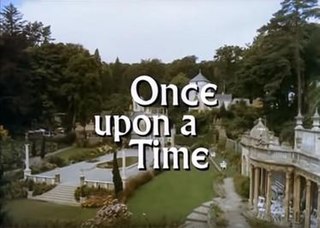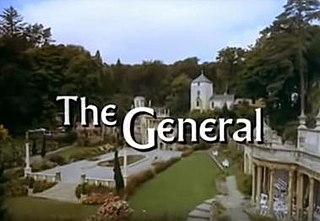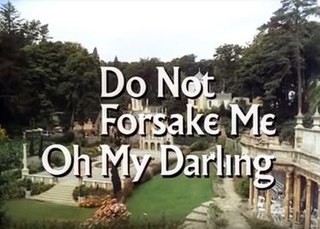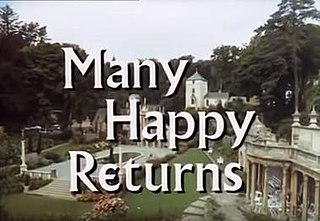
"Arrival" is the first episode of the allegorical British science fiction TV series The Prisoner. It was written by George Markstein and David Tomblin, and directed by Don Chaffey. It was first broadcast in the UK on ITV on Friday 29 September 1967, and first aired in the United States on CBS on Saturday 1 June 1968.

"The Chimes of Big Ben" is an episode of the allegorical British science fiction TV series, The Prisoner. It was written by Vincent Tilsley and directed by Don Chaffey and fifth to be produced. It was the second episode to be broadcast in the UK on ITV on Friday 6 October 1967 and first aired in the United States on CBS on Saturday 8 June 1968.

"Fall Out" is the 17th and final episode of the allegorical British science fiction series The Prisoner. It was written and directed by Patrick McGoohan who also portrayed the incarcerated Number Six. The episode was first broadcast in the UK on ITV on Thursday 1 February 1968 and first aired in the United States on CBS on 21 September 1968.

Man in a Suitcase is a British television private eye thriller series produced by Lew Grade's ITC Entertainment. It originally aired in the United Kingdom on ITV from 27 September 1967 to 17 April 1968. ABC broadcast episodes of Man in a Suitcase in the United States from 3 May to 20 September 1968.

"Once Upon a Time" is the penultimate episode of the allegorical British science fiction TV series, The Prisoner. It was written and directed by Patrick McGoohan and sixth to be produced. It was first broadcast in the UK on ITV on Thursday 25 January 1968 and first aired in the United States on CBS on Saturday 14 September 1968.

The Invisible Man is a British black-and-white science fiction television series that aired on ITV. It aired from September 1958 to July 1959, on CBS in the USA, two seasons. Of which these shows amounted to twenty-six one-half-hour episodes. This series was loosely inspired by the 1897 novel which was authored by the famous H. G. Wells. This television program was one of at least four 'Invisible Men' television series. This interation deviates from the novel making the character's name Dr. Peter Brady. The character remains sane, opposed to a lunatic as in the book or the 1933 film adaptation. No characters from the novel appear in the series.

"The Schizoid Man" is an episode of the allegorical British science fiction TV series, The Prisoner. It was written by Terence Feely, directed by Pat Jackson and was the seventh produced. It was the fifth episode to be broadcast in the UK on ITV on Friday 27 October 1967 and first aired in the United States on CBS on Saturday 6 July 1968.

"Living in Harmony" is an episode of the allegorical British science fiction TV series, The Prisoner. It was written by David Tomblin and Ian L. Rakoff and directed by Tomblin and was the fifteenth produced. It was broadcast in the UK on ITV on Friday 29 December 1967 and was not screened in the United States on CBS during the initial network run.

"Hammer into Anvil" is an episode of the allegorical British science fiction TV series The Prisoner. Written by Roger Woddis and directed by Pat Jackson, it was the twelfth episode produced. It was the tenth episode to be broadcast in the UK on ITV on Friday 1 December 1967 and first aired in the United States on CBS on Saturday 31 August 1968.

"Free for All" is an episode of the allegorical British science fiction TV series The Prisoner. It was written and directed by Patrick McGoohan and the second episode to be produced. It was the fourth episode to be broadcast in the UK on ITV on Friday 20 October 1967 and first aired in the United States on CBS on Saturday 29 June 1968.

"The Girl Who Was Death" is an episode of the allegorical British science fiction TV series, The Prisoner. It was written by Terence Feely and directed by David Tomblin and was the sixteenth produced. It was broadcast in the UK on ITV on Thursday 18 January 1968 and aired in the United States on CBS on 7 September 1968.

"The General" is an episode of the allegorical British science fiction TV series, The Prisoner. It was written by "Joshua Adam" – a pseudonym for Lewis Greifer – and directed by Peter Graham Scott. It was the tenth to be produced and was the sixth episode to be broadcast in the UK on ITV on Friday 3 November 1967. It first aired in the United States on CBS on Saturday 13 July 1968.

"Dance of the Dead" is an episode of the allegorical British science fiction TV series The Prisoner. It was written by Anthony Skene and directed by Don Chaffey and fourth to be produced. It was the eighth episode to be broadcast in the UK, on ITV on Friday 17 November 1967, and first aired in the United States on CBS on Saturday 27 July 1968.

"Checkmate" is an episode of the allegorical British science fiction TV series, The Prisoner. It was written by Gerald Kelsey and directed by Don Chaffey and third to be produced. It was the ninth episode to be broadcast in the UK on ITV on Friday 24 November 1967 and first aired in the United States on CBS on Saturday 17 August 1968.

"It's Your Funeral" is an episode of the allegorical British science fiction TV series, The Prisoner. It was written by Michael Cramoy and directed by Robert Asher and eighth produced. It was the eleventh episode to be broadcast in the UK on ITV on Friday 8 December 1967 and first aired in the United States on CBS on Saturday 10 August 1968.

"A Change of Mind" is an episode of the allegorical British science fiction TV series, The Prisoner. It was written by Roger Parkes and directed by Patrick McGoohan and ninth produced. It was the twelfth episode to be broadcast in the UK on ITV on Friday 15 December 1967 and first aired in the United States on CBS on Saturday 24 August 1968.

"Do Not Forsake Me Oh My Darling" is an episode of the allegorical British science fiction TV series, The Prisoner. It was written by Vincent Tilsley and directed by Pat Jackson and was the fourteenth produced. It was the thirteenth episode to be broadcast in the UK on ITV on Friday 22 December 1967 and first aired in the United States on CBS on Saturday 3 August 1968.

"Many Happy Returns" is an episode of the allegorical British science fiction TV series The Prisoner. It was written by Anthony Skene and directed by Patrick McGoohan. The thirteenth episode produced, it was the seventh episode to be broadcast in the UK on ITV on Friday 10 November 1967, and first aired in the United States on CBS on Saturday 20 July 1968.

The Graham Norton Show is a British comedy talk show presented by Graham Norton. It was initially broadcast on BBC Two, from 22 February 2007, before moving to BBC One in October 2009. It currently airs on Friday evenings, with Norton succeeding Friday Night with Jonathan Ross in BBC One's prestigious late-Friday-evening slot in 2010.
High Living was the first British soap opera to be produced in Scotland, and was produced by Scottish Television. The series was conceived by Henry Hay and episodes were written by Henry Hay and Jack Gerson,.




















